More than 4.5 million young people are currently unemployed in the EU, with countries such as Italy at the top of these statistical charts in which there is a 39.8% youth unemployment rate. Yet from the 18th January 2016, a new procedure, The European Professional Card (EPC), may be able to lower such statistics. The European Professional Card is the latest process through which professional qualifications can be recognised in other European countries via an e-portfolio.
Contrary to its name, this is not a physical card but instead, electronic proof that an application to work in another country within the EU has been granted. This card also has an alert mechanism, through which host countries are able to recognise counterfeit diplomas or individuals who have been banned from practice. It will be useful for those who are currently searching for temporary or permanent positions within another EU country in the following five professions, nursing, pharmacy, physical therapy, mountain guiding and real estate. As a result, this system could benefit countless Italians in the light of recent high unemployment rates. From 2014 to 2015 approximately 1,140 Italians became registered nurses, whilst in other countries, most notably England, there is an obvious shortage in this sector with 7,000 fewer nurses coming from abroad in comparison to ten years ago.
Therefore, this scheme could clearly benefit the European health system as a whole and increase mobility, thereby increasing the number of employment opportunities for Italian citizens. However, this card will not completely replace the traditional channels, as other professionals will still have to use the standard methods of application when requesting to work abroad.
The system itself is a fully electronic procedure that operates through The Internal Market Information System (IMI) to aid the mobility of professionals within the European Union. You create a profile and an application and if approved, you will receive the EPC in the format of a certificate, which recognises your suitability to work in the host country.
This does not strictly act as a passport, you may still need authorisation to work, however this initiative simplifies the procedure of getting documentation and qualifications recognised in another country.
Furthermore, if the host country does not respond to your request in the allotted time, you are automatically granted recognition and will receive your EPC certificate. On the other hand, if application is not approved, the reason for rejection will be stipulated and you have the opportunity to appeal. This new system streamlines the professional application system, allows you to keep track of your application online and saves all data, consequently saving time on possible re-applications in the future.
Despite the speed and convenience of this process, it is important to note that it is possible for your home or host country to charge a fee for the examination of your files, nonetheless, this is a faster form of data submission. For example, wait time for applying to work abroad temporarily is a few days to three weeks, whilst for those wishing to settle permanently in another country within the European Union may wait for up to three months. Furthermore, the EPC can be validated for the long term, if planning to work in the host country permanently, or temporarily, for 18 months, or for those working in the public and health services temporarily, 12 months.
The system simplifies a once complicated and bureaucratic process and could be a way to further unite countries within the European Union, however there are some concerns about its validity and security as a system. Niall Dickson, Chief Executive of the General Medical Council, stated, “that the introduction of the European professional card for doctors would further jeopardise our ability to protect patients in the UK.” He acknowledged that the BHS relies on professionals from around the world, yet believes that there are “major weaknesses in the regulatory system” which may compromise the safety of patients. Regardless of personal opinion, The European Professional Card has been released and only time will tell if this new initiative, with the aim of aiding the mobility of professionals throughout Europe, will be a success.



